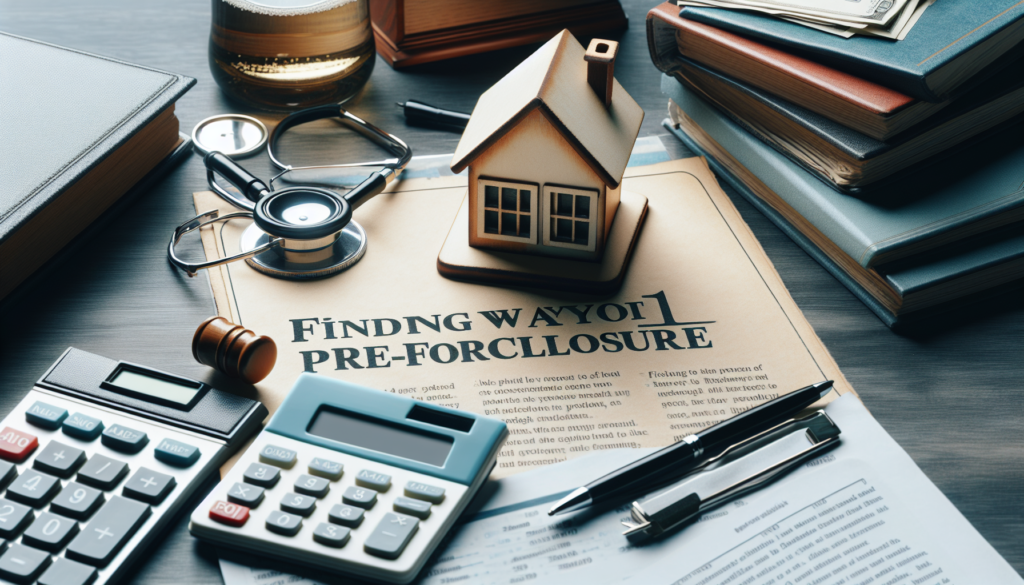
Facing foreclosure can be one of the most challenging experiences a homeowner can go through. The fear of losing your home and the uncertainty of your financial future can feel overwhelming. However, it’s crucial to understand that foreclosure doesn’t have to be the final chapter. By understanding the foreclosure process and knowing your options, you can take steps to escape it and protect your financial well-being.
In this guide, we’ll break down the foreclosure basics, common foreclosure alternatives, and strategies to help you avoid foreclosure or reduce its impact. Whether you’re looking to sell your home before foreclosure or exploring foreclosure relief options, knowing what’s available to you is the first step toward a more secure future.
If you’re in need of foreclosure help for homeowners, this article will outline actionable steps and resources that can provide much-needed relief. Let’s dive into how foreclosure works and how you can escape the process to protect your home and financial stability.
What Happens During Foreclosure?
The foreclosure process begins when a homeowner defaults on their mortgage payments. The lender or bank takes legal action to seize the property in order to recoup the remaining balance on the loan. The process typically starts after a homeowner has missed several payments, usually three or more, and the lender has been unable to reach an agreement for repayment.
During the foreclosure, the lender will issue a foreclosure notice, which signals the start of legal proceedings. Depending on your location, there are different stages, including judicial and non-judicial foreclosures. In a judicial foreclosure, the lender must file a lawsuit in court and obtain a judgment before selling the home. In a non-judicial foreclosure, the process doesn’t involve court action and is generally faster.
Once a foreclosure auction is scheduled, the lender may sell the property to the highest bidder. This auction is often the final step in the foreclosure process if no resolution is reached.
Foreclosure Help for Homeowners: Escaping Foreclosure
While the foreclosure process can be intimidating, there are several ways to stop it in its tracks. By exploring foreclosure avoidance strategies, you can take proactive measures to avoid foreclosure or minimize its impact.
Loan Reinstatement
One option to stop foreclosure is loan reinstatement, which allows you to bring your mortgage current by paying the past due amount, along with any late fees. If you’ve fallen behind due to temporary financial hardship but have the ability to catch up on payments, this could be an effective solution. However, keep in mind that reinstating the loan doesn’t solve long-term financial issues and should be considered if you’re able to resume regular payments.
Foreclosure Alternatives: Short Sale vs. Deed in Lieu of Foreclosure
For homeowners unable to bring their loan current, there are alternatives to avoid foreclosure. Short sales and deeds in lieu of foreclosure are two common options that can help prevent foreclosure from hitting your credit report as severely.
A short sale is an option in which you sell the home for less than the amount you owe on the mortgage. The lender agrees to forgive the remaining balance of the loan. This process requires lender approval but can be a good way to minimize the damage to your credit and avoid the foreclosure auction process.
A deed in lieu of foreclosure is another alternative where you voluntarily transfer the title of your property to the lender in exchange for the forgiveness of the mortgage. While this option is generally faster than foreclosure, it’s not always available for all homeowners, as it requires the lender’s approval and may not be suitable if there are other liens on the property.
Both of these alternatives can be viable ways to get out of foreclosure, but they come with their own risks and should be discussed thoroughly with your lender.
Foreclosure Prevention Programs
Some foreclosure prevention programs can help you avoid foreclosure altogether. Many government agencies, such as the U.S. Department of Housing and Urban Development (HUD), offer programs to help struggling homeowners. These programs typically focus on mortgage forbearance options or loan modifications, where the lender agrees to reduce your monthly payments, extend the loan term, or adjust the interest rate to make it easier to manage the mortgage.
These programs are designed to provide temporary relief and should be explored if you’re facing financial hardship. The goal is to give you enough time to recover financially and avoid losing your home.
Selling Your Home Before Foreclosure
For some homeowners, the best option may be to sell your home before foreclosure occurs. Selling your home allows you to avoid the foreclosure proceedings and the negative impact it has on your credit score. While the market may not be ideal in every situation, it’s possible to sell your home quickly and move on from the financial burden of an unaffordable mortgage.
Working with a real estate investor can help streamline the process, allowing you to sell your home quickly and without the burden of costly repairs. Cash buyers can often purchase properties “as-is,” meaning you don’t need to make expensive renovations or improvements to attract buyers.
Stopping the Foreclosure Process Last Minute
If you’re facing an imminent foreclosure auction, you may still have options to stop the process last minute. Many homeowners in this situation consider filing for bankruptcy to avoid foreclosure. Filing for bankruptcy can temporarily halt the foreclosure process, giving you time to regroup and explore other options. However, bankruptcy should not be considered lightly and should be discussed with a legal professional.
Another option to halt foreclosure is to negotiate with lenders. If you’re close to the foreclosure auction, lenders may be willing to work with you, especially if you can prove that you’re making a good faith effort to repay the debt. In some cases, lenders may grant an extension or offer a loan modification to help you keep your home.
Common Questions About Foreclosure and Selling Your Home
1. What happens if my home goes to foreclosure auction?
When a home is sold at a foreclosure auction, the highest bidder will purchase the property, and the lender will recoup the loan balance. If the property doesn’t sell, the lender will take ownership of the home.
2. Can I sell my home before foreclosure?
Yes, selling your home before foreclosure is often the best way to avoid foreclosure and minimize the damage to your credit. Many homeowners opt for a short sale to sell the home for less than the mortgage balance.
3. How does foreclosure affect my credit?
Foreclosure can significantly damage your credit score. It will remain on your credit report for up to seven years, making it harder to secure future loans or credit.
4. What are foreclosure alternatives?
Alternatives to foreclosure include loan modification, short sale solutions, and deed in lieu of foreclosure. These options allow you to avoid foreclosure and may help minimize the financial impact.
5. Can I negotiate with my lender to avoid foreclosure?
Yes, in some cases, you can negotiate with your lender to avoid foreclosure. Lenders may offer foreclosure prevention programs, a loan modification, or work out a repayment plan to help you keep your home.
Escape Foreclosure Today and Take Control of Your Future
Foreclosure doesn’t have to be the final chapter for your home. At Peerpoint Property Solutions, we specialize in offering fast cash offers to homeowners facing foreclosure. Instead of letting foreclosure take control of your life, take action now and explore foreclosure alternatives with us. Whether you’re looking to sell your house quickly or seeking a way out of foreclosure, we’re here to help you navigate the process.
Don’t wait for the foreclosure auction to happen—act now and take control of your financial future. Visitus to learn more about our buying process and how we can help you sell your house without the stress of foreclosure.

:max_bytes(150000):strip_icc()/__opt__aboutcom__coeus__resources__content_migration__mnn__images__2018__03__shutterstock_1051823762-0b00dcf9cd99473cabaff5546d745b0a.jpg)


